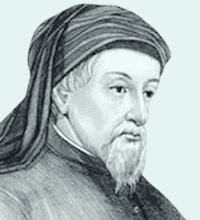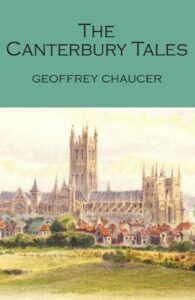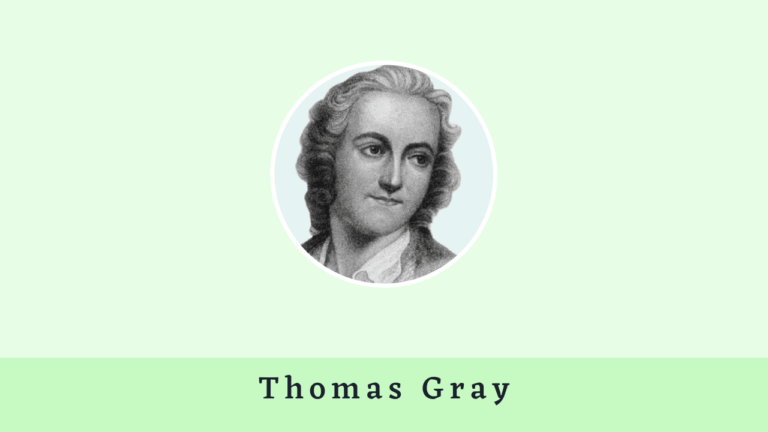Geoffrey Chaucer, often referred to as the greatest English poet of the Middle Ages, is considered the “father of English literature, or the “father of English poetry”. Chaucer was buried as a first English literary figure in what has since come to be called Poets’ Corner, in Westminister Abbey. Chaucer was born between the years 1340-1345 in London most likely in the early 1340s, though the precise date and location remain unknown.

“Purity in body and heart May please some–as for me, I make no boast. For, as you know, no master of a household Has all of his utensils made of gold; Some are wood, and yet they are of use.” – Geoffrey Chaucer (1340-1400)
Chaucer has descended from two generations of wealthy London vintners, and several previous generations had been merchants in Ipswich. His family name is derived from the French chausseur, meaning “shoemaker”. In 1324, his father John Chaucer was kidnapped by an aunt in the hope of marrying the 12-year-old to her daughter in an attempt to keep property in Ipswich. Later, the aunt was imprisoned and fined a good sum which suggests that the family was financially secure.
John Chaucer married Agnes Copton, who inherited properties in 1349, including 24 shops in London from her uncle Hamo de. The first of the “Chaucer Life Records” appears in 1357, in the household accounts of Elizabeth de Burgh, the Countess of Ulster, when he became the noblewoman’s page through his father’s connections, a common medieval form of apprenticeship for boys into knighthood or prestige appointments.
The countess was married to Lionel, Duke of Clarence, the second surviving son of the king, Edward III, and the position brought the teenage Chaucer into the close court circle, where he was to remain for the rest of his life. He also worked as a courtier, a diplomat, and a civil servant, as well as working for the king from 1389 to 1391 as Clerk of the King’s Works. Around 1366, Chaucer married Philippa (de) Roet. She was a lady-in-waiting to Edward III’s queen, Philippa of Hainault, and a sister of Katherine Swynford. Who later became the third wife of John of Gaunt. It is uncertain how many children Chaucer and Philippa had, but three or four are most cited.
As per a tradition, Chaucer studied law in the Inner Temple at this time. He became a member of the royal court of Edward III as a valet de chambre, yeoman, or esquire on 20 June 1367, a position which could entail a wide variety of tasks. His wife also received a pension for court employment. He travelled about many times, at least some of them in his role as a valet. Around 1368, Chaucer is believed to have written The Book of the Duchess in honour of Blanche of Lancaster, the late wife of John of Gaunt. Who died in 1369 of the plague.
In 1378, Richard II sent Chaucer as an envoy to the Visconti and to Sir John Hawkwood, English condottiere in Milan. It has been speculated that it was Hawkwood on whom Chaucer based his character to the Knight in the Canterbury Tales, for a description matches that of a 14th-century condottiere. While still working as comptroller, Chaucer appears to have moved to Kent, being appointed as one of the commissioners of peace for Kent, at a time when French invasion was a possibility.
Chaucer died of unknown causes, although the only evidence for the date comes from the engraving on his tomb which was erected more than 100 years after his death. There is some speculation that he was murdered by enemies of Richard II or even on the orders of his successor Henry IV, but the case is entirely circumstantial. Chaucer was buried in Westminster Abbey in London, as was his right owing to his status as a tenant of the Abbey’s close. In 1556, his remains were transferred to a more ornate tomb, making him the first writer interred in the area now known as Poets’ Corner.
The Age of Chaucer
Geoffrey Chaucer belonged to the middle of the 14th century. It was the second half of the 14th century, that English literature made a bright beginning. That was the beginning of the new age, popularly known as the Age of Chaucer. According to John Dryden Chaucer is the father of English poetry. Dryden venerates Chaucer as highly as the Greeks venerated Homer and the Romans venerated Virgil.
Chaucer is regarded as the first great modern. In those dark days when the light of modernism had not yet been visible on the horizon, Chaucer anticipated the modern taste and the ‘modern mind’. In his poetry he introduced qualities which were advanced of his time. Chaucer is undoubtedly the founder of English language and English literature. With him the English language and literature grew at a bound to full maturity. No other middle English writer has his skill, his range, his complexity, and his large humane outlook.
Chaucer made several contributions to English poetry. He enlarged the scope and range of the poet, introduced minute observation of life around him, gave vivid and clear descriptions of the conditions of his times, excelled in characterization, human pathos, made narration of art and above all gave a new form and shape to English language and versification. In fact his genius was versatile. He had a lot of experiences- yeoman, soldier, esquire, diplomat, courtier, official, member of Parliament and so on.
These were the sources of his astounding and novel literary inspiration. His multiplicity of involvement and occupations enabled him to grasp the numerous experiences of life. The rare literary genius in him successfully transmitted all those experiences into his writings to create several lasting works of art and made him the father of English poetry.
Chaucer’s literary production is vast, gigantic, comprehensive and impressive. His mastery as a literary craftsman and thinker, he remained almost unsurpassable. None but Shakespeare seems to have surpassed his creative originality and novelty. He remains in the top of the history of English literature. He is the forerunner of those great literary figures whose names shine permanently in the chronicles of English literature.
Chaucer as a Father of English Poetry
Geoffrey Chaucer, one of the greatest poets of England, is also regarded as the father of English literature and represents the two conflicting worlds—the Medieval and the Renaissance. During those dark years, when the light of modernism was not yet visible on the horizon, Chaucer anticipated the modem taste and the modern mind and his poetry introduced qualities far in advance of his times. His poetry reflects the medieval spirit as well as that of the Italian Renaissance, which was making its first influence felt in the England of his times.
With Chaucer, English literature systematically developed. He fitted by both natural genius and the circumstances of his life to become the most technically accomplished, the most wide ranging and the most universally appealing of medieval English writers, and indeed, one of the most skillful and attractive of English writers of any period. He was the first great English poet, who combined the French and the Italian streams of literature and brought forth a type of poetry unrivalled in its sunny realism.
Chaucer’s modernism is best reflected in his realism. He reflects the real life of the England of his day. The Prologue to the Canterbury Tales is an epitome of 14th century England; with great force and realism he has painted the life and people of his times. His portrayal of character is quite realistic; with a few deft touches, he brings his characters to life. They are individuals as well as types. His twenty-nine pilgrims come from all the different classes, peoples and professions of his time and find a vivid expression in his poetry.
The major break of Chaucer from his medievalism is his dissociation from the medieval religious dogmas. Ecclesiastic ideas and medieval habits of the mind were still the controlling elements in Chaucer’s period, but in him their sway is broken by the spirit of Italian Renaissance. He is the morning star of Renaissance and it is through him that its free, secular spirit expresses itself in English poetry. He loves human nature, including all its weakness and takes a frank joy in the good things of life. He is aware of the corruption in the churches, but nowhere lashes it fiercely as does Langland. His wide sympathy, gentle humanity, tolerance etc. make him really the first of the great moderns.
His humour is the expression of his joy in life and of his wide sympathy and tolerance. Humour is also present in the predecessors and contemporaries of Chaucer, but in them only occasionally and fitful flashes of humour are found. Humour is the life and blood of Chaucer’s work. His humour is multi-sided and all-pervasive. He never lashes bitterly at folly or vice, but ever looks on and smiles.
Geoffrey Chaucer as a Pioneer for Modern English Poetry
Geoffrey Chaucer is also a great linguistic contributor. By emancipating himself from the foreign influences and by using his own native language as the medium for his art, he became the pioneer for modern English poetry. He found English a dialect and left it a language. While all others of his age were local or provincial, he alone is national. He is the first national poet of England, for he gave to the people a language, so reformed and reshaped as to be a potent instrument for the expression of thought.
Similarly, Chaucer is one of the most musical of all English poets. His English looks very difficult at first, but it can easily be mastered with a little perseverance. He struck a modern note when he abandoned altogether the old English irregular lines and alliteration and adopted the French method or regular motto and end rhymes. Under his influence, rhyme regularly displaced alliteration in English poetry. He discarded complicated stanza form for the first time, in his verse, and achieved simplicity and freedom, which is the characteristic note of modern English poetry.
His descriptions are masterpieces. Chaucer’s best descriptions of men, manners and places, when giving details of a conventional spring morning and flowery gardens, have a vivacity that makes his poetry unique. He takes joy in the beauty of nature, as he did in life and in the company of his fellow men. His descriptions of the countryside are, to some extent, things of tradition only. But he has a real nature, particularly of the spring.
Chaucer’s realism, his characterisation, his rejection of, medieval conventions, his love for life and last but not least, his service to the English language and versification—all give him the title of “the father of English poetry”. At once, he marks the culmination of the medieval spirit and initiation of the, yet-to-come Renaissance spirit.
Geoffrey Chaucer major works include The Book of the Duchess, The House of Fame, The Legend of Good Women and Troilus and Criseyde. He is best known for The Canterbury Tales. Chaucer is a crucial figure in developing the legitimacy of the vernacular, Middle English, at a time when the dominant literary languages in England were French and Latin. Chaucer’s major work, The Book of the Duchess, was an elegy of Blanche of Lancaster (who died in 1369).

The Canterbury Tales
Geoffrey Chaucer
Edited with Introductions, Bibliographies, Footnotes and on-page Glossaries by Dr Lesley A. Coote, Lecturer in Medieval & Renaissance Studies, University of Hull.

